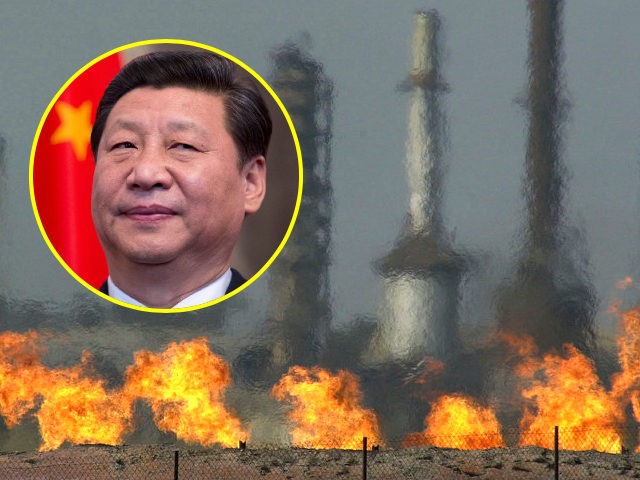Qatar’s state-owned QatarEnergy corporation announced a massive deal this weekend with the Chinese regime-owned company Sinopec to provide Beijing with 3 million tons of liquified natural gas (LNG) a year for the next 27 years – and a stake in Qatar’s North Field South (NFS) gas project.
The agreement follows a similar, but smaller, deal signed in April that gave the Chinese fossil fuel giant control of a 1.25-percent stake North Field East (NFE), a sprawling natural gas field also currently in development. China also has a concurrent 27-year agreement with Qatar currently in vigor which provides the regime with four million tonnes of LNG annually, beginning in 2022.
QatarEnergy celebrated the new agreement on Sunday as a “testament to the excellent bilaterial relations” Qatar, an Islamist theocracy, enjoys with communist China. The CEO of QatarEnergy and Qatar’s Minister of State for Energy Affairs Saad Sherida al-Kaabi, claiming expanding Qatar’s dealings in LNG, a fossil fuel, helped the world move along on the “road to a realistic energy transition” away from fossil fuels and highlighted the corporation’s belief that “the energy transition is one of the most pressing challenges of our time.”
The expansion of the North Field natural gas projects is believed to contain “the world’s biggest natural gas reserves and extends under the Gulf into Iranian territory,” the Agence France-Presse (AFP) reported on Sunday.
Qatar is home to one of the world’s largest LNG reserves and is one of the world’s most prolific exporters of the fossil fuel. While China is the world’s second-largest economy and a manufacturing powerhouse, it lacks significant reserves of natural gas, coal, or crude oil, forcing it to rely on allied states.
QatarEnergy signed its agreement with Sinopec at a major import conference in Shanghai. According to its press release on the deal, “QatarEnergy will transfer a 5% interest to Sinopec in a joint venture company that owns the equivalent of 6 million tons per annum (MTPA) of LNG production capacity in the NFS project.”
“The long-term LNG SPA signed today follows another SPA signed in November 2022 for the supply of 4 MTPA of LNG over 27 years, the longest LNG supply agreement in the history of the industry,” the press release continued. “These historic milestones are a testament to the excellent bilateral relations between the People’s Republic of China and the State of Qatar as well as between Sinopec and QatarEnergy.”
At the Shanghai event, al-Kaabi insisted that LNG, while a fossil fuel, was necessary to “transition” the global economy away from fossil fuels, and that any attempt to replace fossil fuels with wind, solar, or other so-called renewable energy sources would require a “realistic” approach.
“The State of Qatar has firmly supported the role of natural gas as a central component of any energy mix on the road to a realistic energy transition,” the CEO said. “We are providing the world with the cleanest hydrocarbon source of energy, which enjoys both economic and environmental qualities to support sustainable growth and a better future. In fact, by 2029, about 40% of all new LNG supplies will be provided by Qatar.”
“Therefore, we believe that a stronger relationship between the world’s largest LNG producer and the world’s largest energy consumer is a natural development of the realities shaping the energy map today,” he insisted.
China’s Sinopec became the first Asian shareholder in North Field East, a related LNG development to NFS, in April. Sinopec heralded that deal as necessary to help China “secure long-term and reliable clean energy.” Outside of Sinopec’s LNG activities, however, China is the world’s worst polluter and implements policies set to dramatically increase carbon emissions in the long-term, the core concern of the “climate change” movement. China began accelerating its coal consumption at the beginning of this decade, developing over three times the amount of coal-fueled electrical capacity in 2020 as the rest of the world combined.
As of August, China has approved the construction of over 300 more coal power plants in 2023, with no signs of stopping. China is a party to the Paris Climate Agreement, allegedly created to curtain carbon emissions, but the Agreement includes allowances for China to increase its carbon emissions through 2030.
Qatar has long maintained close ties to China.
It is a member of China’s Belt and Road Initiative (BRI), a global debt-trap plan in which China uses predatory loans to expand its influence over poor nations, and it was a vocal supporter of the 2022 Beijing Winter Olympics, which human rights activists decried as a disgrace given China’s ongoing genocide of Muslim people in East Turkistan. Qatar, despite being an Islamic country, has also supported the genocide of Uyghurs and other Muslims under Chinese communism.
Beijing, in turn, enthusiastically supported Qatar as the host country of the 2022 FIFA World Cup, similarly derided as a poor host for its widespread abuse of women, suspected gay and lesbian people, and brutal implementation of sharia, or Islamic law, on its people.

COMMENTS
Please let us know if you're having issues with commenting.